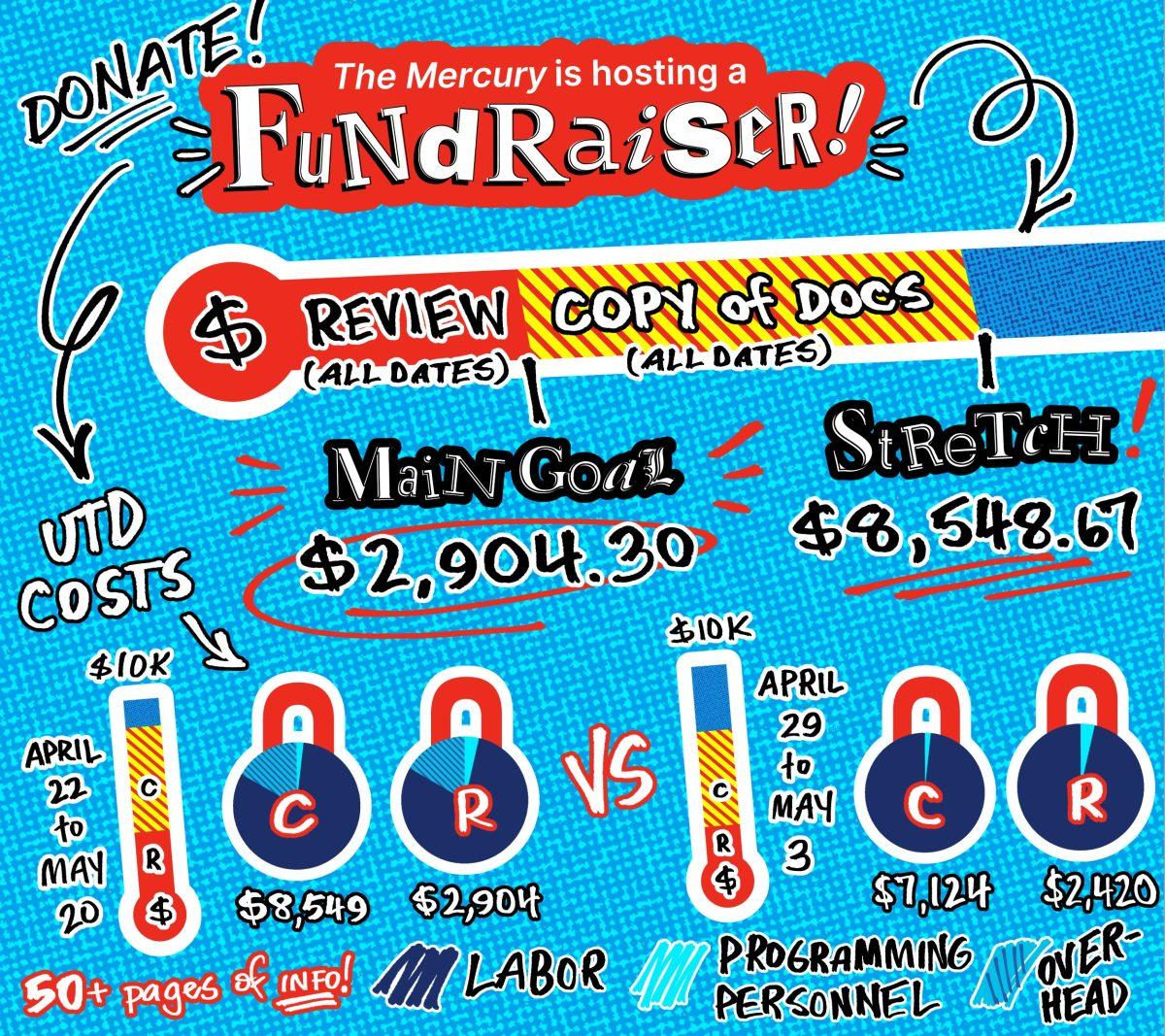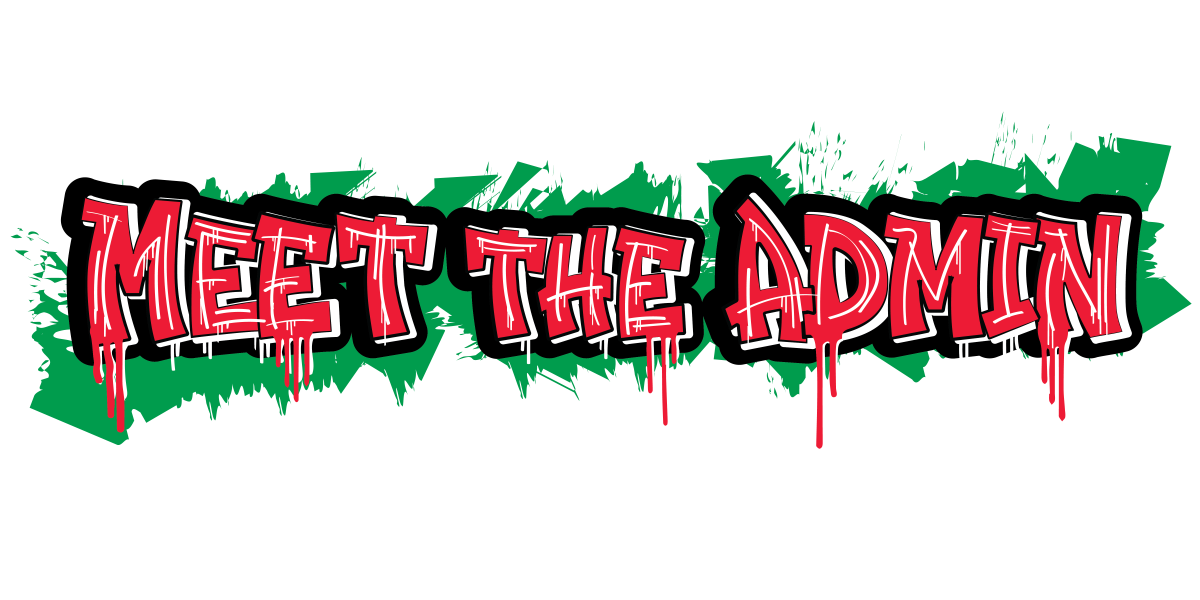UPDATE: As of July 22, The Mercury has raised $3,015 — enough to cover the $2,905 fee for reviewing the public records we requested as well as GoFundMe’s transaction fee. UTD’s Office of Legal Affairs said The Mercury is allowed to take photos and notes of the documents during the review process, which we will release immediately to the public once we have reviewed them all. Since we can provide readers with the public records’ exact contents, we will no longer be pursuing the $8,549 stretch goal to access digital copies. The Mercury thanks you for your support and will continue updating our readers as we proceed with review.
In recent years, The Mercury has pursued all kinds of investigative stories — from exposing workplace discrimination to pursuing sexual harassment cases to breaking news about crime and death. This is the first time our editorial team can’t get out of a sticky situation alone.
The unforgettable events of May 1 — UTD students constructing the “Gaza Liberation Plaza” encampment to protest for a free Palestine, which was raided by police and resulted in the arrests of 21 students, professors, alumni and community members who now face active litigation — required historic, unprecedented work from The Mercury. We published four breaking news articles, released an emergency issue of the newspaper May 20 which explored the experiences of those jailed, publicized administration’s and the local community’s response to the arrests and continued investigating on multiple fronts in the ensuing weeks. We have spoken with those arrested, lawyers, community members, UTD faculty, professional journalists and more, but one group we have had no success with — despite months of attempts — is communicating with UTD’s administration. To answer critical questions like ’why were 60 law enforcement officials called to disperse a peaceful protest?’, ‘what attempts, if any, did campus administration make to deescalate the situation?’, ‘what specific policy did demonstrators violate?’ and ‘what charges, legal and academic, is the UTD filing against students and faculty arrested?’, The Mercury filed a Texas Public Records request — and got slammed with a hefty price tag.
A public records request, filed under the Texas Public Information Act, allows anyone from journalists to concerned citizens to access documents, emails, texts, phone call logs and more from government institutions and their staff, including government employees, police personnel and public university administrators. The process is slow and full of contention — no one likes to give up potentially embarrassing or incriminating records — but it is a right for all Texans. Journalists submitting PIA requests can seek fee waivers because of the educational content or public good releasing those public records can do. But UTD has denied that The Mercury needs these records for a legitimate reason and, therefore, has charged us significant fees for access.
We requested communications, memos and schedules from UTD President Richard Benson, UTD Vice President and Chief of Staff Rafael Martín, UTDPD Chief of Police Brent Tourangeau and Dean of Students Amanda Smith — all of whom were involved with the May 1 events — that discussed topics like “protest,” “Collin County Jail,” “Texas DPS,” “criminal trespass” and “Greg Abbott,” among other keywords and legal clauses suggested by lawyers The Mercury consulted. UTD’s Office of Legal Affairs, which handles public records requests, has quoted us four prices depending on the date range and style of information delivery.
The cost of collecting and providing The Mercury with records dated between April 22 and May 20 that are relevant to our request is more expensive than providing records dated between April 29 and May 3. The wider date range should reveal more information about how administration responded to the preceding week of protests and how UTD is proceeding with litigation and policy in the arrests’ aftermath. Sending The Mercury electronic copies of all relevant records costs more than allowing document inspection, where our Editor-in-Chief will visit the legal office to read the materials. Having access to physical copies allows The Mercury to publish them for our readers to have physical proof of their existence and contents, while with inspection, our readership must trust what we report about the documents instead of seeing the documents themselves.
The cost of obtaining copies of all relevant records from April 22 to May 20 — estimated at well over 50 pages of information — is $8,548.67. The cost of inspection of all relevant records in the same date range is $2,904.30. The cost of obtaining copies of all relevant records from April 29 to May 3 — tentatively over 50 pages of information, but fewer than the wider date range — is $7,123.89, and the cost of inspection in the same date range is $2,420.25.
While it is possible to appeal to the attorney general of being unfairly charged for a PIA request, the current Attorney General Ken Paxton and the broader Texas court system have historically been hostile to students and journalists and likely to side with Office of Legal Affairs’ fees; every journalist and lawyer The Mercury spoke with cautioned against appealing. Therefore, The Mercury is proceeding with a fundraiser to gather enough money to purchase these documents. This fundraiser will run until September 30 or until sufficient funds have been gathered to cover the cost of the request. Our goal is $2,904.30 for inspection of as much information as possible; any extra money raised will go toward the $8,548.67 stretch goal to provide publishable copies to our readers and be refunded if the stretch goal is not met. Proof of payment to the Office of Legal Affairs and continuing updates on the PIA process will be provided to all donors as soon as possible.
The Mercury attempted multiple times over the course of a month to speak with administration directly and avoid filing a PIA request at all, but administrators were unresponsive despite our insistence — even when we violated our own policy and sent a question list instead of sitting down for a formal interview. Instead of information, The Mercury was met only with delays and meeting cancellations. We consulted press lawyers and seasoned journalists at every step to ensure our PIA request really was our best remaining option and that it is structured to be as cheap and informative as possible.
We cannot determine exactly what information the PIA request will provide us until we have the documents. We might discover that administrators were told to have protesters arrested and to squash protest activity by someone in the state government. We might discover that administration is planning on firing the arrested faculty or withholding degrees from arrested students. We might discover that those arrested were brought to Collin County Jail despite being arrested in Dallas County’s jurisdiction for a particular legal or political reason. We might discover something else or nothing at all — but it is our duty as journalists to do the digging and keep the public informed. If this story, the political movement around Palestine or the futures of those arrested matter to you, we urge you to donate — and help us grow closer to accessing the truth.
Donate to our fundraiser at https://tinyurl.com/mercurygfm or by scanning the QR code below. Every little bit helps. The Mercury thanks you for your commitment and support to investigating the most significant campus event in recent memory.













